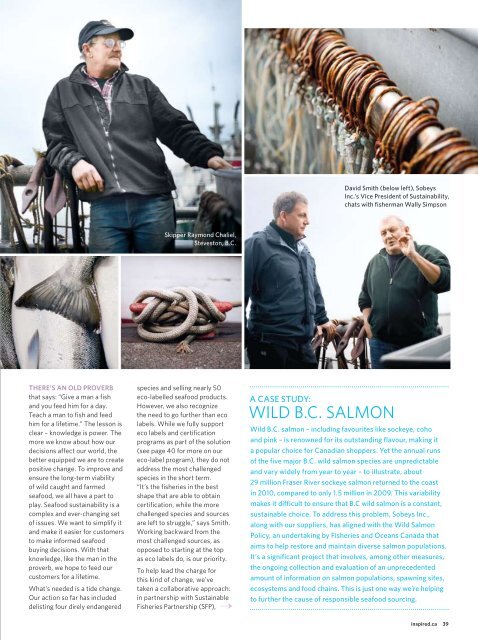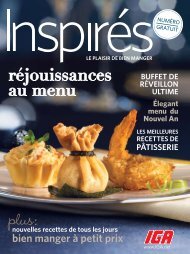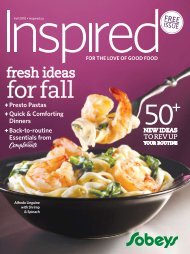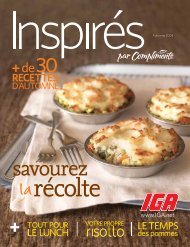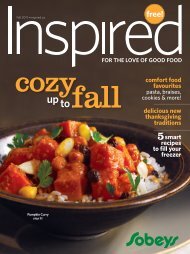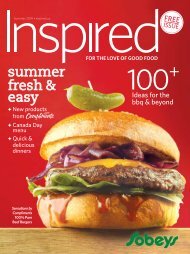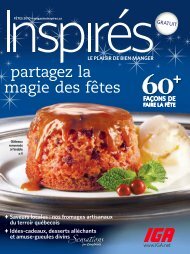Download - Inspired.ca
Download - Inspired.ca
Download - Inspired.ca
Create successful ePaper yourself
Turn your PDF publications into a flip-book with our unique Google optimized e-Paper software.
David Smith (below left), Sobeys<br />
Inc.’s Vice President of Sustainability,<br />
chats with fisherman Wally Simpson<br />
Skipper Raymond Chaliel,<br />
Steveston, B.C.<br />
There’s an old proverb<br />
that says: “Give a man a fish<br />
and you feed him for a day.<br />
Teach a man to fish and feed<br />
him for a lifetime.” The lesson is<br />
clear – knowledge is power. The<br />
more we know about how our<br />
decisions affect our world, the<br />
better equipped we are to create<br />
positive change. To improve and<br />
ensure the long-term viability<br />
of wild <strong>ca</strong>ught and farmed<br />
seafood, we all have a part to<br />
play. Seafood sustainability is a<br />
complex and ever-changing set<br />
of issues. We want to simplify it<br />
and make it easier for customers<br />
to make informed seafood<br />
buying decisions. With that<br />
knowledge, like the man in the<br />
proverb, we hope to feed our<br />
customers for a lifetime.<br />
What’s needed is a tide change.<br />
Our action so far has included<br />
delisting four direly endangered<br />
species and selling nearly 50<br />
eco-labelled seafood products.<br />
However, we also recognize<br />
the need to go further than eco<br />
labels. While we fully support<br />
eco labels and certifi<strong>ca</strong>tion<br />
programs as part of the solution<br />
(see page 40 for more on our<br />
eco-label program), they do not<br />
address the most challenged<br />
species in the short term.<br />
“It’s the fisheries in the best<br />
shape that are able to obtain<br />
certifi<strong>ca</strong>tion, while the more<br />
challenged species and sources<br />
are left to struggle,” says Smith.<br />
Working backward from the<br />
most challenged sources, as<br />
opposed to starting at the top<br />
as eco labels do, is our priority.<br />
To help lead the charge for<br />
this kind of change, we’ve<br />
taken a collaborative approach:<br />
in partnership with Sustainable<br />
Fisheries Partnership (SFP),<br />
A <strong>ca</strong>se study:<br />
Wild B.C. salmon<br />
Wild B.C. salmon – including favourites like sockeye, coho<br />
and pink – is renowned for its outstanding flavour, making it<br />
a popular choice for Canadian shoppers. Yet the annual runs<br />
of the five major B.C. wild salmon species are unpredictable<br />
and vary widely from year to year – to illustrate, about<br />
29 million Fraser River sockeye salmon returned to the coast<br />
in 2010, compared to only 1.5 million in 2009. This variability<br />
makes it difficult to ensure that B.C wild salmon is a constant,<br />
sustainable choice. To address this problem, Sobeys Inc.,<br />
along with our suppliers, has aligned with the Wild Salmon<br />
Policy, an undertaking by Fisheries and Oceans Canada that<br />
aims to help restore and maintain diverse salmon populations.<br />
It’s a signifi<strong>ca</strong>nt project that involves, among other measures,<br />
the ongoing collection and evaluation of an unprecedented<br />
amount of information on salmon populations, spawning sites,<br />
ecosystems and food chains. This is just one way we’re helping<br />
to further the <strong>ca</strong>use of responsible seafood sourcing.<br />
inspired.<strong>ca</strong> 39


